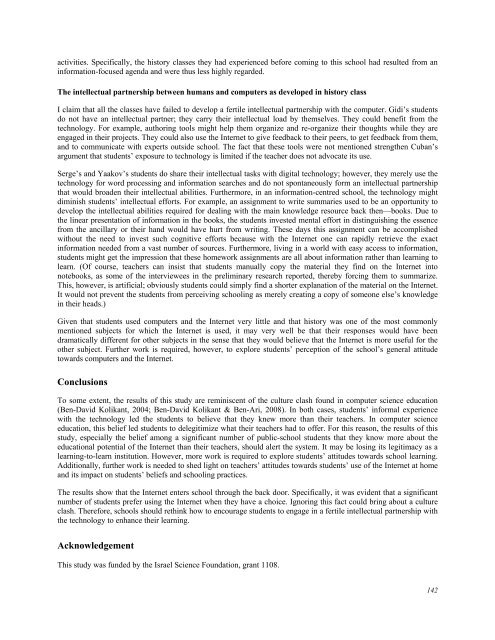Download - Educational Technology & Society
Download - Educational Technology & Society
Download - Educational Technology & Society
You also want an ePaper? Increase the reach of your titles
YUMPU automatically turns print PDFs into web optimized ePapers that Google loves.
activities. Specifically, the history classes they had experienced before coming to this school had resulted from an<br />
information-focused agenda and were thus less highly regarded.<br />
The intellectual partnership between humans and computers as developed in history class<br />
I claim that all the classes have failed to develop a fertile intellectual partnership with the computer. Gidi’s students<br />
do not have an intellectual partner; they carry their intellectual load by themselves. They could benefit from the<br />
technology. For example, authoring tools might help them organize and re-organize their thoughts while they are<br />
engaged in their projects. They could also use the Internet to give feedback to their peers, to get feedback from them,<br />
and to communicate with experts outside school. The fact that these tools were not mentioned strengthen Cuban’s<br />
argument that students’ exposure to technology is limited if the teacher does not advocate its use.<br />
Serge’s and Yaakov’s students do share their intellectual tasks with digital technology; however, they merely use the<br />
technology for word processing and information searches and do not spontaneously form an intellectual partnership<br />
that would broaden their intellectual abilities. Furthermore, in an information-centred school, the technology might<br />
diminish students’ intellectual efforts. For example, an assignment to write summaries used to be an opportunity to<br />
develop the intellectual abilities required for dealing with the main knowledge resource back then—books. Due to<br />
the linear presentation of information in the books, the students invested mental effort in distinguishing the essence<br />
from the ancillary or their hand would have hurt from writing. These days this assignment can be accomplished<br />
without the need to invest such cognitive efforts because with the Internet one can rapidly retrieve the exact<br />
information needed from a vast number of sources. Furthermore, living in a world with easy access to information,<br />
students might get the impression that these homework assignments are all about information rather than learning to<br />
learn. (Of course, teachers can insist that students manually copy the material they find on the Internet into<br />
notebooks, as some of the interviewees in the preliminary research reported, thereby forcing them to summarize.<br />
This, however, is artificial; obviously students could simply find a shorter explanation of the material on the Internet.<br />
It would not prevent the students from perceiving schooling as merely creating a copy of someone else’s knowledge<br />
in their heads.)<br />
Given that students used computers and the Internet very little and that history was one of the most commonly<br />
mentioned subjects for which the Internet is used, it may very well be that their responses would have been<br />
dramatically different for other subjects in the sense that they would believe that the Internet is more useful for the<br />
other subject. Further work is required, however, to explore students’ perception of the school’s general attitude<br />
towards computers and the Internet.<br />
Conclusions<br />
To some extent, the results of this study are reminiscent of the culture clash found in computer science education<br />
(Ben-David Kolikant, 2004; Ben-David Kolikant & Ben-Ari, 2008). In both cases, students’ informal experience<br />
with the technology led the students to believe that they knew more than their teachers. In computer science<br />
education, this belief led students to delegitimize what their teachers had to offer. For this reason, the results of this<br />
study, especially the belief among a significant number of public-school students that they know more about the<br />
educational potential of the Internet than their teachers, should alert the system. It may be losing its legitimacy as a<br />
learning-to-learn institution. However, more work is required to explore students’ attitudes towards school learning.<br />
Additionally, further work is needed to shed light on teachers’ attitudes towards students’ use of the Internet at home<br />
and its impact on students’ beliefs and schooling practices.<br />
The results show that the Internet enters school through the back door. Specifically, it was evident that a significant<br />
number of students prefer using the Internet when they have a choice. Ignoring this fact could bring about a culture<br />
clash. Therefore, schools should rethink how to encourage students to engage in a fertile intellectual partnership with<br />
the technology to enhance their learning.<br />
Acknowledgement<br />
This study was funded by the Israel Science Foundation, grant 1108.<br />
142
















